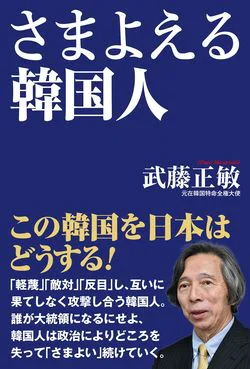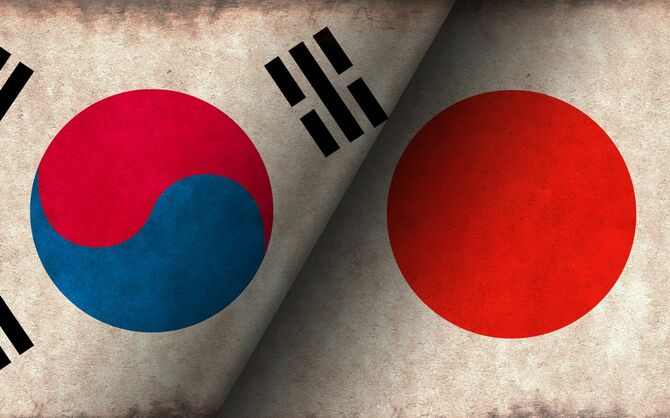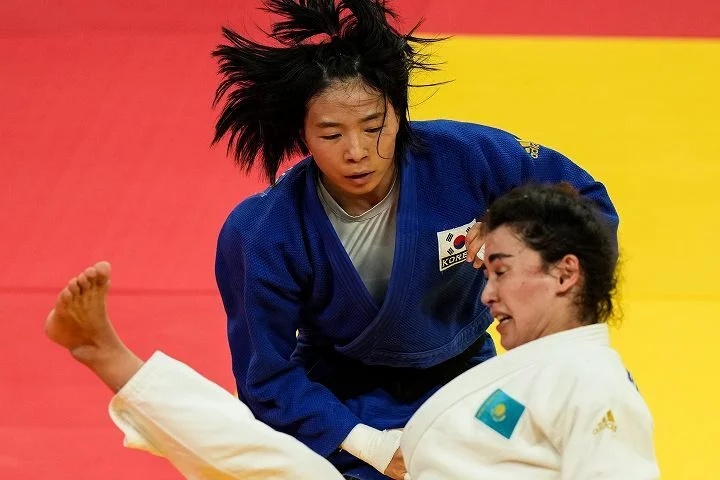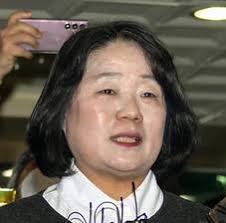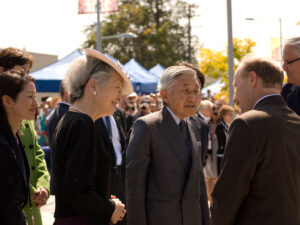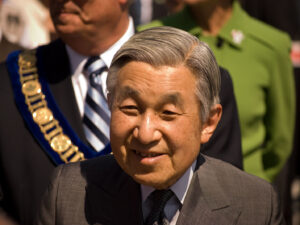Running for the supplementary election, assuming the post of party representative, and going on hunger strike were all done to evade arrest, and the bottom line was seen through.
Former President Moon Jae-in visits Ri Jae-myung, who was hospitalized on September 19 (Yonhap News Agency/Kyodo News Images)
(Masatoshi Muto, former ambassador extraordinary and plenipotentiary to South Korea)
On September 21, the South Korean National Assembly voted on an arrest consent bill submitted by prosecutors against Lee Jae-myung, leader of the largest opposition party, the Co-operative Democratic Party, and passed the bill with 149 in favor, 136 against, 6 abstentions, and 4 invalid votes. The reasons for the arrest warrant request were due to suspicion of involvement in illegal money transfers to North Korea and “suspicion of preferential treatment for the Baekhyun-dong development project.
The majority of lawmakers present for passage is 148. This means that the government, the ruling party, and the prosecutors won by only one vote. The number of DPJ lawmakers who participated in the vote was 167. This means that there were about 30 defectors from within the DPJ. The Chosun Ilbo reported that at least “29 members of the opposition party are believed to have rebelled” if members of the ruling party, parties close to the ruling party, and independent lawmakers voted in favor of the motion.
Major Progress Toward Ri Jae-myeong’s Arrest
Following the passage of the consent bill by the National Assembly, a court warrant review will now be conducted to determine whether or not an arrest warrant should be issued.
In fact, the court’s review of the arrest warrant has resulted in nearly 20% of cases where the issuance of the warrant was not approved, so the situation is still unclear. However, as pointed out by the Chosun Ilbo, Ri Jae-myung has so far been consistent in his explanations that he is “not involved” or “does not know” about the allegations, but this is not true, as testimonies from related parties have revealed.
During the court’s examination of the warrant, the possibility of his escape or destruction of evidence will be considered.
Han Dong-hoon, Minister of Justice, explained to the National Assembly the necessity of the arrests, saying, “A large number of persons involved are systematically involved, and there is a great concern about the destruction of evidence through coercion and pressure on accomplices. In fact, the situation is not favorable to Lee Jae-myung, as he has had a history of trying to conceal his own involvement in the case.
In this light, the prosecutors have broken through the biggest barrier to “arresting” Ri Jae-myung.
With the passage of the consent bill for Ri Jae-myung’s arrest, the DPJ will begin a search for the culprits who voted in favor of the bill. Before the National Assembly vote, the DPJ’s secretary general had threatened the party’s members that he would “thoroughly track down and find those who voted to pass the bill and end their political lives.
During the Moon Jae-in administration, the DPJ strongly defended the administration, so the scandals that occurred in the Moon Jae-in administration were not fatal, and the party enjoyed a high approval rating thanks to the DPJ’s strong support. However, the reason for the large number of defections that occurred during the recent vote on the consent to arrest party representatives must have been that an increasing number of lawmakers are becoming aware of public criticism of the DPJ’s abuse of the right to arrest. This sense of crisis was expressed in the form of a negative vote vote.
No one from the DPJ is leading the anti-Japanese movement anymore.
If Ri Jae-myung were actually arrested, it would have a major “impact” on Japan. In other words, the DPJ’s “anti-Japan line” would likely come to an end.
In relation to the DPJ, Yun Mika, a former director of the Council for the Issue of the Paratroopers in Japan and a member of the Diet (now an independent), was sentenced on September 20 by the appeals court to one and a half years in prison and a three-year suspended sentence for embezzlement and other crimes at the time. Yun is likely to appeal to the Supreme Court, where, if found guilty, she will lose her position as a Diet member. Thus, as in the past, major figures engaged in anti-Japanese activities within the DPJ or in positions close to the DPJ are on the verge of losing their seats in the legislature.
Perhaps because of this, the public is no longer following the recent “anti-Japanese agitation” in South Korea.
The DPJ’s current campaign against the discharge of treated water from the Fukushima Daiichi Nuclear Power Plant has been led by Representative Lee Jae-myung, but even so, the number of ordinary citizens attending the last opposition rally was down to about 2,000. If Lee Jae-myung is arrested, the movement may lose further momentum.
It is conceivable that opposition to the release of treated water will continue as a reaction to the Yun Seok-yue administration’s pressure on Ri Jae-myung, but it is an anti-government struggle, and the anti-Japanese meaning will diminish. It is inevitable that the DPJ’s anti-Japanese activities will lose further momentum in the future.
Virtually Rejecting the Pledge to Renounce Arrest Privileges
In the first place, Representative Ri Jae-myung had publicly pledged to waive the “right to arrest” that members of the National Assembly have. However, on January 20, the day before the National Assembly vote, Yi Jae-myung posted on Facebook from his hospital bed, “Please stop the runaway locomotive of the prosecutorial dictatorship,” criticizing the “clearly illegal and unjustified passage of the arrest consent bill, which gives wings to the political prosecutor’s maneuvering investigation,” and effectively flipped the “non-arrest privilege” that he had declared himself. In effect, he easily reversed his own declaration that he would waive his privilege against arrest.
Because of this background, the ruling party, the “People’s Power,” viewed Representative Lee Jae-myung’s initiation of the hunger strike as an attempt to evade arrest, and his protests have not gone unnoticed. The party believes that the series of moves from the hunger strike was a tactic by Lee Jae-myung to increase unity within the party and increase opposition votes by pushing himself to the limit of his physical strength in the fasting struggle, and he is determined not to give up on the arrest of Lee Jae-myung.
Ri Jae-myung is currently “in the hospital. On September 18, the 19th day of his hunger strike, he complained of poor health and was taken to the hospital by ambulance. Was his main goal to evade arrest? Ri Jae-myung’s Political Activities
The Chosun Ilbo, JoongAng Ilbo, and Yonhap newspapers have analyzed the possibility that Ri Jae-myung’s appeal for the rejection of the arrest agreement the day before the vote was to take place was perceived as a “reneging on his pledge,” and may have had the opposite effect.
In retrospect, it can be seen that all of Yi Jae-myung’s actions to date have actually been aimed at “evading arrest,” even though he has publicly stated that he would “renounce his right to arrest. The public is beginning to sense this. The “appeal for rejection” of the bill may have provoked a reaction from the public and even from members of the Democratic Party of Korea that “I knew it.
It is fair to say that Lee Jae-myung has consistently focused his political activities since his defeat in the presidential election on defending himself against arrest.
Three months after his defeat in the presidential election, Representative Lee came forward and won a supplementary election for a member of the National Assembly, which was unusual. First of all, he secured the parliamentarians’ right of non-arrest.
Two months after becoming a member of the National Assembly, he won the election for the presidency of the largest opposition party. In addition to seizing control of the majority party in the National Assembly, he has held a bulletproof National Assembly session (to prevent Lee’s arrest) without missing a single day over the past year.
The DPJ also amended its party constitution to allow the party president to retain his position even if he is indicted and to run in the general election even if he is convicted in the first or second trial.
All of these series of actions are beginning to be understood as an attempt to evade arrest. He may be criticized for using national elections and party primaries to save his own skin.
Even though his subordinates were arrested and committed suicide, he himself was only trying to save his own skin.
Although many of his close associates have been arrested in connection with the allegations against Ri Jae-myung, and five people have already committed suicide, Ri himself has consistently denied any involvement.
One of the charges in the arrest is that the South Korean underwear manufacturer Sang Bang Wool Group transferred $3 million (approx. 440 million yen) to North Korea on behalf of Ri Jae-myung, and the prosecutors are intensively pursuing this allegation.
In a written statement submitted by Lee Jae-myung on August 9, he responded to questions about the promotion of his visit by saying, “I did not know about it, and Lee Hwa-young (Vice Governor) did everything,” placing the responsibility on his subordinates. However, it has been revealed that Vice Governor Ri made a statement to prosecutors during the course of the trial, saying, “I reported to Ri Jae-myung the contents concerning remittances to North Korea.
From this, we can see that his first priority is to save his own skin.
It is not surprising that there are some within the DPJ who do not want to follow Mr. Ri Jae-myung in this way. It is no wonder that those who are not of the Ri Jae-myung camp are determined that the DPJ should not fall in with Ri Jae-myung.
The DPJ is now on the verge of a split. Yonhap News Agency reported, “The Democratic Party of Korea (DPJ) is facing the possibility of the arrest of its leader, while at the same time, the factional conflict is deepening and there are fears that the party may split. The opposition from Lee’s supporters is also expected to add to the situation, making it difficult to avoid violent turmoil both inside and outside the party.
With the passage of the arrest agreement, Lee’s leadership has weakened considerably. The growing criticism that Lee has defied his pledge to renounce his immunity from arrest and that his hunger strike was aimed at evading arrest is expected to turn off his supporters.
Furthermore, Yonhap News Agency reported, “If the arrest warrant for Lee is actually issued, the Democratic Party of Korea will face an intensifying confrontation between the ‘pro-Li Jae-myung’ camp, which seeks to maintain the current leadership system in the absence of a representative, and the ‘non-Li Jae-myung’ camp, which calls for a change in leadership.
Although Ri Jae-myung would normally be expected to step down from his post as president if he were arrested, he has stubbornly refused to be arrested and is not likely to resign. In fact, he is likely to stick to his position as representative for the sake of protecting his own interests.
Anti-Japan is the Ri Jae-myung Agenda, and His Absence Directly Linked to Anti-Japan Backslide
When Mr. LEE Jae-myung’s influence was strong, the anti-Japanese movement involving the general public was active. However, after Ri Jae-myung’s influence waned, the number of ordinary citizens participating in anti-Japanese activities declined sharply, and the movement transformed into an activist-oriented movement.
Yi Jae-myung has repeatedly condemned Japan on historical issues such as comfort women and labor conscription. However, with the coming of the Yun Seok-yue administration, the public no longer hides its true intentions to improve relations with Japan. For this reason, they switched the focus of their criticism of Japan to the release of treated water from the Fukushima Daiichi Nuclear Power Plant. The off-site rally was led by Lee Jae-myung.
The number of participants was about 7,000 on August 24 when the water was first released (note: what is considered a large-scale rally in South Korea is at least 100,000 people), but it gradually declined thereafter, with the last rally held two weeks later having about 2,000 participants.
Moreover, the latest sharp decline in attendance comes as Yi Jae-myung has been waging a fasting struggle and strongly seeking public support. It is not surprising that his influence has declined significantly, as he has lost popularity for trying to protect himself in the face of arrests and suicides of his subordinates over allegations that he was involved.
The DPJ can no longer afford to engage in anti-Japanese activities.
It is fair to say that the public no longer has confidence in Ri Jae-myung, who has been leading anti-Japanese activities. During the Moon Jae-in administration, he was criticized for being “pro-Japanese” when he defended Japan, but once the Yun Seok-yue administration began to improve relations between Japan and South Korea, the public began to feel comfortable speaking favorably of Japan. There is no longer a need to make pro-Japanese relations a taboo subject. On the contrary, anti-Japanese activities by politicians will no longer lead to support.
It is unlikely that any influential person in the current DPJ will try to lead anti-Japanese activities. There are members of the DPJ who have been shouting in Japan against the release of treated water from the Fukushima plant, but will anyone listen to them after Ri Jae-myung is gone?
The DPJ, in serious disarray, held a series of emergency closed-door meetings of the Supreme Committee and an emergency meeting of lawmakers. House spokesperson Lee So-young revealed, “It is very shocking because the result was unexpected,” and “It is regrettable that the leadership appealed several times to the lawmakers to reject the proposal, but a different result came out.
In addition, Representative Lee Jae-myung did not respond until later that same night.
For the DPJ now, it will be a show of resistance to the Yun Seok-yue administration’s aggressive measures to clamp down on the opposition in order to avert the threat of a split and restore the party’s strength. Still, it will not be easy to regain the public’s trust once it has fallen to the ground.
The ruling party’s pursuit of the DPJ’s misconduct will intensify. The DPJ is now forced to concentrate on how to prevent this from happening.
